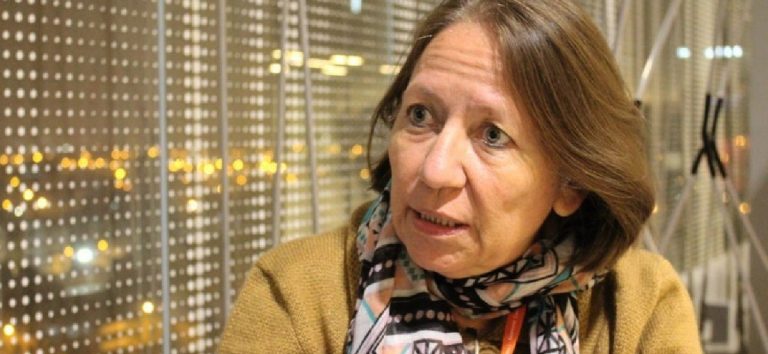6 de mayo 2022

Children of Exile: The Births “Sowing Hope” in the Camp of Nicaraguan Farmers

PUBLICIDAD 1M
PUBLICIDAD 4D
PUBLICIDAD 5D
Director of La Corriente explains that the organization didn’t register as a “foreign agent”, because the law requiring them to do so is unconstitution

María Teresa Blandón, Nicaraguan sociologist. Photo: Maryorit Guevara.
Maria Teresa Blandon, director of the Association for the Regional Feminist Program La Corriente, declared that the government’s justification for closing La Corriente and other NGOs, “has no legality”. La Corriente is one of 50 non-profits whose legal status was nullified by the Ortega regime on May 4th. The closures are allegedly for failing to comply with the current legislation, but according to Blandon, these laws “contradict what’s established in the [Nicaraguan] Constitution, which clearly establishes the freedom of association.”
The “Law for the Regulation of Foreign Agents”, steamrolled through the Sandinista-dominated National Assembly in October 2020, orders NGOs to register as “foreign agents”. Nonetheless, La Corriente decided not to do so, because said legislation – one of a combo of repressive laws fabricated by the regime – “contradicts the Constitution and forces organizations to affiliate themselves with a regime that has invented [these laws],” explained Maria Teresa Blandon, during an interview on the online television news program Esta Noche.
“Our Association opted not to register as a foreign agent because we don’t fit in that definition. We’re a collective made up of Nicaraguans, which has carried out its programs for nearly 30 years within the national territory. It’s made up of national citizens, there’s no reason to declare it a foreign agent,” assured the feminist leader.
She added that the State “has no legitimate pretext to intervene and control the dynamics of the civil society organizations, as in practice, they’ve tried to do, using the law they approved at the end of last year,” she stated.
Through its Interior Ministry, the Ortega regime has utilized the new laws to pressure dozens of organizations that wish to continue their work in the different regions of Nicaragua. These organizations went to the Ministry to complete the process of inscription demanded by the Law for the Regulation of Foreign Agents, but many of them encountered obstacles. A number of those organizations were then annulled, since the regime claimed they hadn’t complied with the legislation.
From the end of 2018 up to the present, the regime of Daniel Ortega and Rosario Murillo has cancelled 218 associations, universities, foundations and organizations: the latest 50 were outlawed on May 4th. Ortega-allied deputy Filiberto Rodriguez threatened to annul more NGOs – according to him, in order to comply with the law.
In the cancellation decrees presented by Rodriguez, the Interior Ministry accused the NGOs of failing to comply with one of three laws: Law #147, the Law for Non-Profit Organizations; Law #606, the Organic Law governing Legislative Powers; or Law #977, the Law against Money Laundering, Financing Terrorism, or Financing the Proliferation of Weapons of Mass Destruction.
Several board members of the annulled organizations were also interviewed by Confidencial. They expressed their sadness at the closure of these NGOs, and the direct impact it will have on their workers. However, they especially highlighted the effect these closures will have on the beneficiaries of different projects in health, protection of women, access to potable water, defense of human rights, environmental protection and more.
The shuttering of La Corriente left ten people unemployed. However, Maria Teresa Blandon stressed that those most harmed are the women who found in the organization a “vitally important” place to confront the discrimination they face, work on the scars they carry from domestic abuse and violence, and strengthen the autonomy of women’s bodies.
La Corriente was born almost 30 years ago, as a way to construct women’s social movements for the defense of their rights. Along the way, the organization broadened its projection, and they’ve collaborated with groups of men and groups for sexual diversity.
Their principal focus has remained on the prevention of gender violence; the promotion of gender equality, and respect for sexual diversity. Maria Teresa estimates they’ve reached thousands of people over their decades of work, through projects in education and investigation, and their awareness campaigns.
The association’s director assures that – despite everything the loss of legal status implies and the hostile context that the country is immersed in – it’s possible to continue working, although “the margin is ever narrower.” “There’s abundant evidence to affirm that we’re living in a police state,” she noted.
This affirmation isn’t only because of the cancellation of the 218 civil society organization in the last four years – 144 in the first months of 2022 alone – but because there’s a persistent suppression of “the right to demonstrate, to mobilize, to denounce.”
Despite these new, more unstable conditions, Blandon assures that the team of La Corriente will continue offering spaces for reflection, formation and awareness. “We can’t give up the work of opening spaces for growth, where we can really live without fear… we’re going to continue trying, despite these very sharp limitations,” she maintained.
Blandon recalled that the international community has abundant evidence of the closing of civic spaces in the country. It’s clear that the police state continues, and that Nicaraguan civil society “is the victim of a ferocious attack, because the regime intends to maintain itself through violence, but also through censorship. All this speaks clearly of the fact that they have no legitimacy, because otherwise, they wouldn’t have to turn to these barbarities.”
This article was originally published in Spanish in Confidencial and translated by Havana Times
Archivado como:
PUBLICIDAD 3M
Confidencial es un diario digital nicaragüense, de formato multimedia, fundado por Carlos F. Chamorro en junio de 1996. Inició como un semanario impreso y hoy es un medio de referencia regional con información, análisis, entrevistas, perfiles, reportajes e investigaciones sobre Nicaragua, informando desde el exilio por la persecución política de la dictadura de Daniel Ortega y Rosario Murillo.
PUBLICIDAD 3D